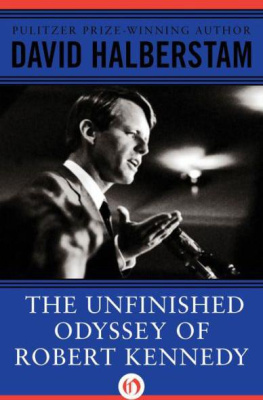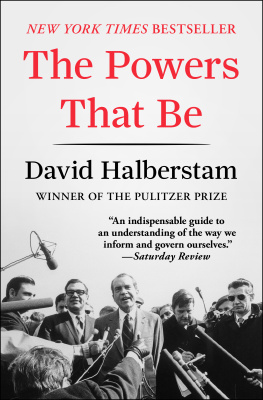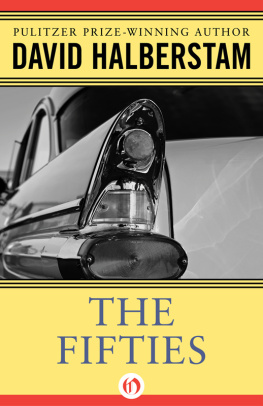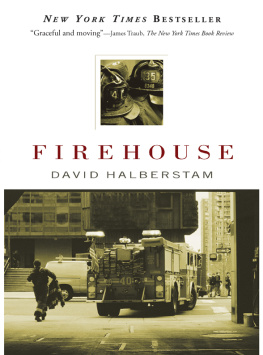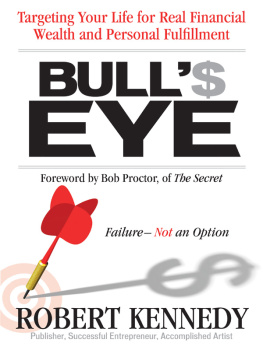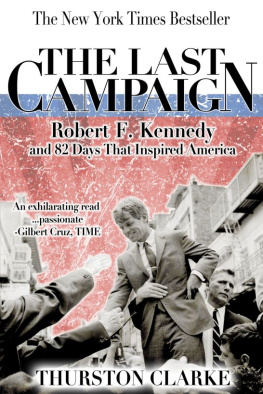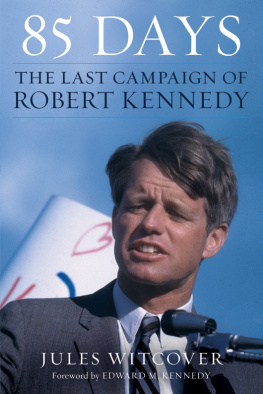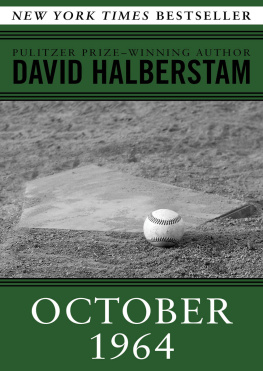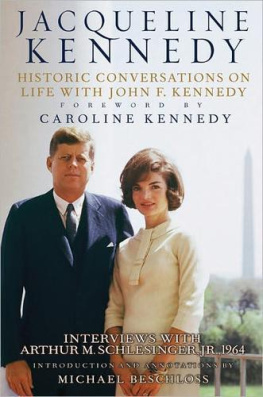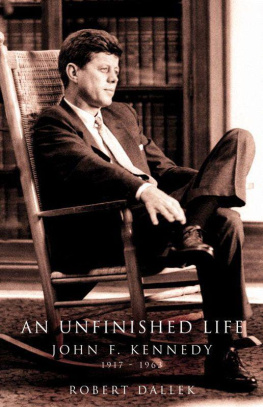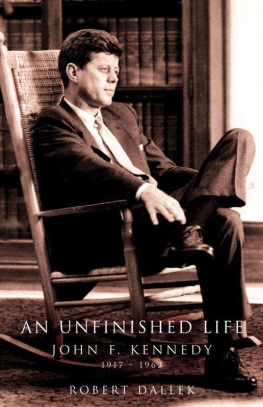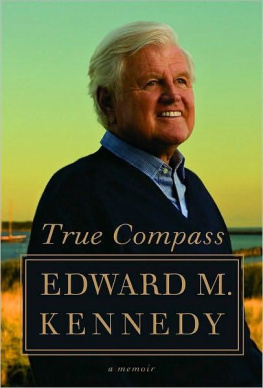The Unfinished Odyssey of Robert Kennedy
David Halberstam

This book is for
Bill Barry
and Dick Tuck
Odyssey: ... 2.... A long series of wanderings, esp when filled with notable experiences, hardships, etc.
The Random House Dictionary of the English Language, Unabridged Edition
I
IN THE LATE SUMMER of 1967, a time of growing social turbulence and dissatisfaction in America, a young liberal named Allard Lowenstein went to visit his senator from New York, Robert Kennedy. A few years before, no two men in the Democratic party could have been more dissimilar: Lowenstein was a reformer, indeed an almost promiscuous reformer. A protg of Eleanor Roosevelt and quick to enter her name in every conversation, he was identified with a vast list, perhaps too vast a list, of good and decent causes. Indeed it was not a liberal cause unless it were championed by Al Lowenstein. He was exactly the kind of person that Robert Kennedy, just a few years before, had most despised. Then Robert Kennedy had been the tough guy, ramrodding through his brothers nomination and election, and the reformers, God, at the beginning the reformers were almost worse than the Republicans. They hemmed and hawed; they talked too much and said too little; and they loved Stevenson. The reformers were too soft; too issue-prone; tooand this was the worst word yetpredictable. In 1960 Kennedy had exploded before New Yorks finest and purest reformers, saying, Gentlemen, I dont give a damn if the state and county organizations survive after November and I dont give a damn if you survive. I want to elect John F. Kennedy President. And they loved that, though in later years when they thought warm thoughts about the Kennedy Presidency they would not remember Robert Kennedys hard work and vital contribution to that end, but rather the harshness of his words.
Kennedy would have considered Lowenstein one of the worst of them. He was very closely associated with the old New Dealers, always running around Mississippi with black people, and had gone to South Africa and written a book about it. Indeed his liberalism was so pure and so all-encompassing that his friends gently and affectionately mocked it. According to Lowenstein legend, a friend once called his house and asked for himAl just left for Spain, replied his mother. You know he never did like that General Franco....
By 1967, however, the intensity of social upheaval had brought Lowenstein and Kennedy closer together. Lowenstein was devoting himself to heightening and sharpening the protest against Lyndon Johnson. Ambitious and deeply committed, a rare moralist-activist, and a member of the board of the ADA (though more radical and less anti-Communist than men ten years older than he), he would appear on campus after campus, a veteran student leader, perhaps the oldest in America, giving a focal point to the growing discontent. Whenever The New York Times ran a full-page ad saying Rhodes Scholars Oppose War In Vietnam, or Mister President, Peace Corps Returnees Oppose Your War, or College Editors Oppose, etc., it was sure to be the work of Al Lowenstein. He had become truly evangelical on the campus, taking the dissenting and the alienated, telling them, really beseeching them, that yes, they could still work within the system, it could still be done, that protest against the war could be effectively registered within the system. Anyone who saw him during those days would remember the almost feverish quality to his work and remember asking him if it were hard to get kids interested in his crusade, and his answering that the only problem was bringing them back into the system; that no one knew how deeply alienated they were. Then he would excuse himself and fly off to Berkeley for two days and from there to Oregon and from there to Idaho. Al Lowenstein had gone everywhere in 1967, haunting Lyndon Johnson, and he had been properly smeared by Government officials. Peace Corps public-information officers had gone as far as to leak material insinuating that he was very left wing. Now, in the late summer, Lowenstein was trying to convince Robert Kennedy to run for President against Lyndon Johnson.
Kennedy, once a conservative, then an unannounced and reluctant liberal whose credentials were regularly challenged by more orthodox liberals, was by 1967 pursuing a course of increasing radicalism-proffering more radical ideas and taking on, from people like Lowenstein, more radical advice. His course was not so much a consistent philosophy as it was the application of his puritanism (what one friend called his perpetual sense of outrage) to a changing America. The more he looked, the more his vision of the country changed; darkening as he saw more of the inequities and more of the failures. The country was in transition politically, and curiously, so was he.
By both intent and heredity Kennedy had become the leader of the honorable opposition in the Democratic party; the leading critic of the administrations treatment of the ghettos, the leading critic of a great Pandoras box of social problems, and if not the leading critic of the war, the most important politically. When J. William Fulbright attacked the war it annoyed the President, but when Robert Kennedy attacked the war it meant that armies might march. The young liberals and radicals in their thirties and forties, and the college students, those who were staying within the system, no longer turned to Hubert Humphrey for their leadership, but to Robert Kennedy.
Lowenstein, this day, was telling Kennedy that the time had come when the speeches on Vietnam in the Senate, and the articles for Look magazine on the ghetto were no longer enough. It was 1967-going-on-1968 and the army, the vast network of conspirators, was ready to march. It had decided that despite the foremost myth of American politicsRule One: You cannot unseat a sitting president of your own partyJohnson must and, more important, could be beaten. Lowenstein felt that the issues were far too great to let traditional party loyalty and regulations dominate. Times were different now. The network was in action and was very strong within the Democratic party; Johnsons invincibility was a myth, he could be beaten. The polls showed otherwise, but the polls reflected the mythology. The politicians said otherwise, but as John Kenneth Galbraith, the head of Americans for Democratic Action and another pioneer in the Bust Johnson movement, had said with great insight and accuracy early in 1967, This is a year when the people are right and the politicians are wrong. It would be a new and different coalition, Lowenstein told Kennedy; it would have to be done outside the party machinery. It would make powerful enemies for Kennedy, but they would be older men; men who, given the changing nature of American politics, would be less influential politically year by year; whereas the friends he would make would be young people and increasingly influential. But it could be done. Johnson was a hollow man politically; no one, and this was crucial, was for him or liked him. The war in the year ahead would get worse, turning more and more hawks to doves, making the opposition more and more respectable. Indeed doing the right thing would be politically advantageous. But the important thing, Lowenstein emphasized, was the nature of the issuesthe war and the ghettos. They were issues of moral imperative, so serious that they did not permit waiting until 1972.
They were good friends now, and had been since 1966 when Kennedy, planning to take a trip to South Africa, had prepared a speech with which he was not totally satisfied. Someone recommended Lowenstein as a South African expert and he, as was the Kennedy wont, was summoned imperiously. He could not come, he said, because he was taking Norman Thomas, who was almost blind, to the Dominican Republic. For Gods sake, Norman Thomas!, Kennedy said, exasperatedfor to him Norman Thomas was

